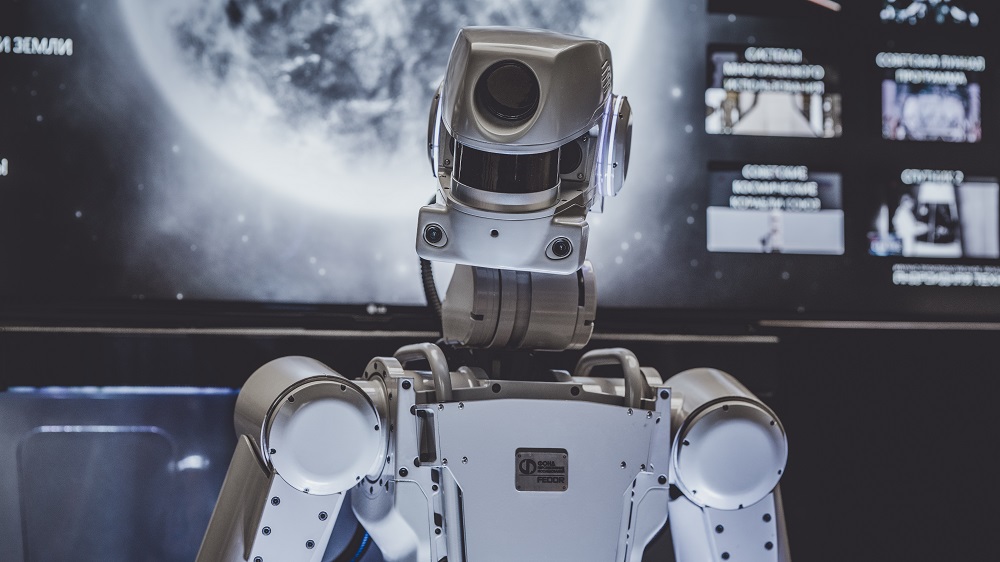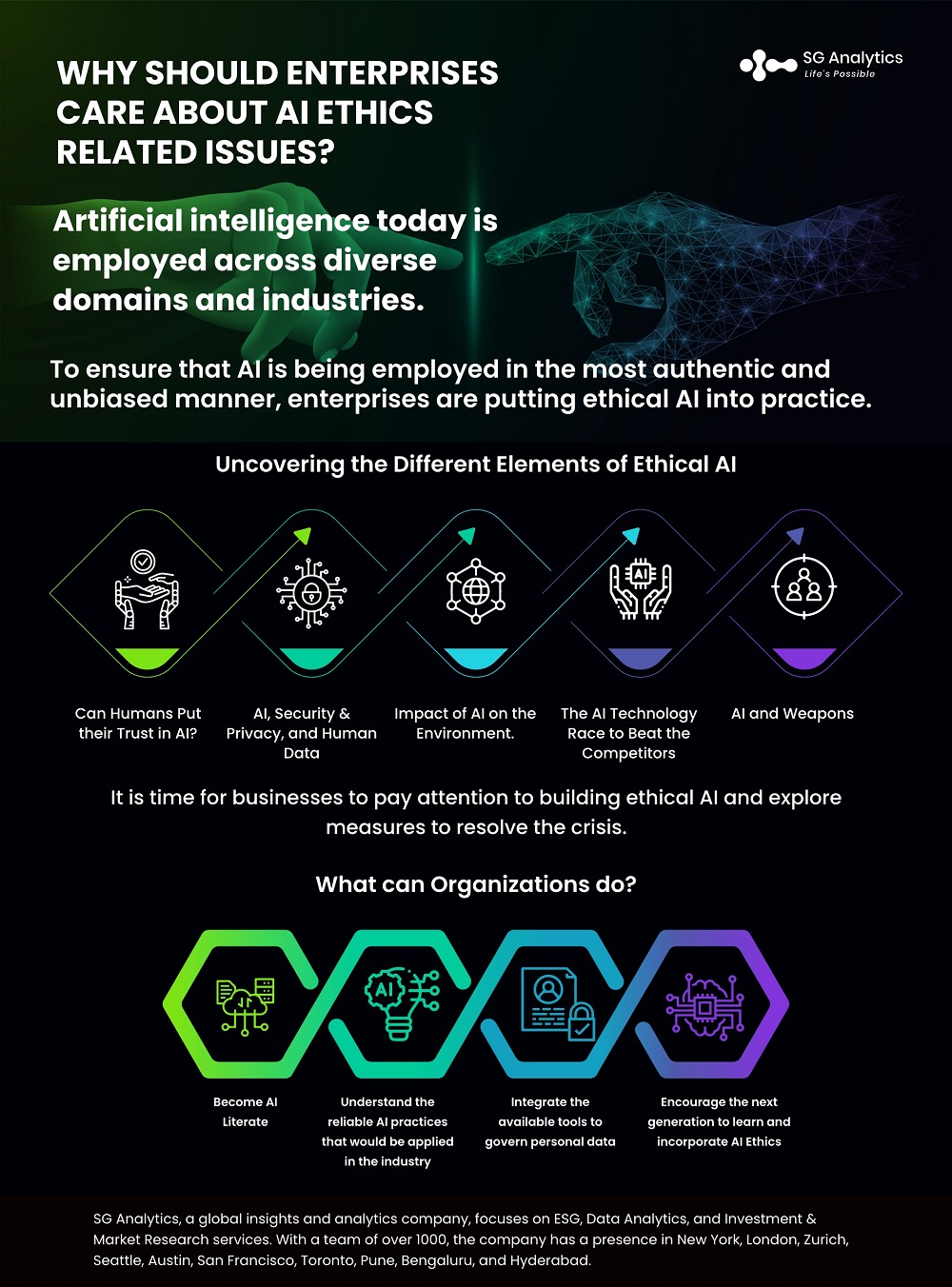The emerging confluence of technology, the internet, along with massive computational resources, as well as Machine learning (ML) and Artificial Intelligence (AI) – has led to the world where it is today. While the value of such innovation is clear, the known risk is less.
Artificial intelligence today can be employed across diverse domains and industries to help automate its operations. But this advanced field of computer science – Artificial Intelligence (AI) – while intended to enhance lives, has now ended up doing much more than good in some instances. Many companies can suffer from reputational or legal damages if AI is employed irresponsibly.
To ensure that AI is being employed in the most authentic, unbiased, and moral manner, it is important for enterprises to put ethical AI into practice. This is where AI Ethics comes into the picture. AI Ethics or Ethical AI is the field that enables organizations to determine how to use such technology responsibly.

For businesses to exercise strong AI ethics, industry leaders must formulate best practices framework or guidelines for tech companies. Top organizations, including Microsoft and IBM, are formulating comprehensive AI ethics guidelines, and smaller tech companies are creating their standard frameworks around how to employ AI ethically and responsibly.
Read more: An Experiment on Effect: How Virtual Technologies like Metaverse Transform Our Way of Life
What is AI Ethics?
AI Ethics presents a set of moral principles that empower organizations to discern between right and wrong working practices. AI ethics provides a set of guidelines that offers suggestions on the design and outcomes of artificial intelligence.
While human beings have all sorts of cognitive biases, these inherited biases are likely to be transferred in the machine behaviors and subsequently in the data. As data forms the foundation for all machine learning algorithms, it is vital to structure experiments and algorithms with this, as artificial intelligence holds the potential to amplify and scale these biases at an unprecedented scale.
With the emergence of big data, organizations have enhanced their focus on driving automation and data-driven decision-making across their operations. The intentions are, however, if not always, to enhance business outcomes, and companies are experiencing unforeseen consequences in many of their AI applications.

With the instances of unfair outcomes coming to light, new guidelines are being designed and formulated, primarily from research as well as the data science communities, to address the biases as well as concerns concerning the ethics of AI. Leading organizations in AI are also putting in their vested interest to shape these guidelines, as they are also experiencing some of the consequences of failing to uphold the AI ethical standards within their products.
Lack of diligence in this area can lead to severe consequences in reputation, regulatory, as well as legal exposure, resulting in costly penalties. With the ongoing technological advances, innovation tends to outpace regulation in this new, emerging field of AI. With appropriate expertise developing within the industry, organizations will be expected to incorporate more AI protocols to follow, thus avoiding any infringements on human rights and civil liberties.
Read more: Tech-Related Ethical Concerns Businesses Should Address in 2022
Uncovering the Different Elements of Ethical AI
AI Ethics encloses many areas at the intersection of technology, privacy, and human values. Some of the major areas are:
-
Can Humans Put their Trust in AI?
AI bias or trust is a major area of ethics that focuses on the need for AI machines that are fair and biased. Humans need to be made aware that decisions made by an AI system are transparent and fair and do not favor or disfavor any groups inappropriately. However, the problem is that fairness itself is a subjective concept to which humans do not agree. This is where the question arises- if humans do not agree, it is not possible for a computer program to please as well.

-
AI, Security & Privacy, and Human Data
Today monitoring devices are everywhere. The last decade of AI experienced that personal data can be utilized for everything, ranging from recommending books to detecting diseases or symptoms. But who has the right to decide what is allowed and what is not? Conversation concerning AI and privacy has always been a topic of debate. With new laws and other regulatory guidelines being introduced, these frameworks empower individuals to control how corporations can utilize private data. Data marketplaces are also driving the control of personal information from companies to individuals.
-
Impact of AI on the Environment
With AI models becoming bigger, the number of resources they are consuming is also on the rise. To train just one large language AI model, as much energy as five cars consume in their lifetime is required. However, on the other hand, AI is offering promise in helping the environment, from greenhouse gas emission detections to discovering novel enzymes that can eat plastics.
-
The AI Technology Race to Beat the Competitors
Nations globally are realizing and recognizing that their competitive advantages today lie in their citizens becoming AI literate. To gain a winning edge in AI technology, economies invest in everything, from data to computing machinery. But what does this signify for the future of small economies versus the large ones? How will the larger economies amass this AI knowledge and dataset resources? Will this lead to the creation of yet another gap?

-
AI and Weapons
Studies have shown that the creative abilities of AI are not just limited to art and poetry. AI holds the potential to create hundreds of potential chemical weapons.
Read more: Tech Trends That Will Shape the Technology Landscape
Establishing Articulate Organizational Values and Ethics
When an organization decides to employ AI in its business model, the next vital step should be to articulate a framework of organizational values and rules on how AI will be employed. Putting a set of principles in place will enable them to figure out how to operationalize the AI activities and make them happen within the organization. Integrating the value into the product should be the ultimate goal. That indicates that the organization should engage the engineers as well as the product managers. They should also engage individuals who are in the leadership and get them on board.
The formulated toolkit will help employees and management consider and include ethical AI practices in their work, like conducting ethical risk sweeping or pre- and post-mortems to respond to and adjust to any ethical failures. These frameworks or guidelines will help outline the best practices around subjects like secure data transfer and privacy.

What can Organizations do?
Like most emerging transformative technologies, AI is advancing on the course of becoming the future that will drive automation as well as innovation on a much larger scale. AI will be responsible for solving or causing our biggest problems.
Due to this reason, AI Ethics are emerging as everyone’s responsibility. From individuals to corporations, there are many things one can incorporate to create an ethical AI experience. Some of the vital elements that enterprises can incorporate include-
- Become AI Literate
- Understand the reliable AI practices that would be applied in the industry
- Integrate the available tools to govern personal data
- Encourage the next generation to learn and incorporate AI Ethics
Read more: NFT Digital Art: The Technology that is Transforming Creativity
Smaller Steps to Create a Massive Impact
Today the tech world is undergoing an explosion of emerging technologies that are helping different industries and businesses to gain a great pool of advantages. However, specific limitations need to be worked upon, and AI is considered one of those technologies. The advances in AI are in the nascent stage, and with time it will enhance its mechanism further, thereby creating great opportunities for different businesses across geographies.
It is indeed high time for businesses to pay attention to building ethical AI. Businesses need to explore measures to resolve the crisis and bring grimmer effects to the users than ever before.

It is time for businesses to think and discover avenues to identify the trust factors that are present or missing with the companies and government initiatives. Further, they should also check if there are any bad influences carved by the organizations to influence the outcome. With the relentless approach being employed to improve the platform to build ethical AI, businesses can better tackle malicious attacks to prevent themselves from data invasion and privacy.
With a presence in New York, San Francisco, Austin, Seattle, Toronto, London, Zurich, Pune, Bengaluru, and Hyderabad, SG Analytics, a pioneer in Research and Analytics, offers tailor-made services to enterprises worldwide.
A leader in the Technology domain, SG Analytics partners with global technology companies across market research and scalable analytics. Contact us today if you are in search of combining market research, analytics, and technology capabilities to create compelling business outcomes driven by technology.

